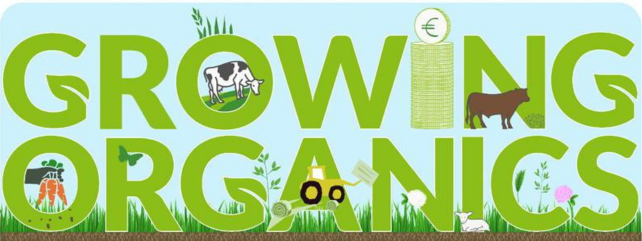Tillage: Tommy Delahunt, Ballinaclogh, Co. Wicklow
Wednesday, 9th July | 11am
A Growing Organics Tillage Farm Walk took place on Wednesday, 9 July on the farm of Tommy Delahunt, Ballinaclogh, Co. Wicklow.
Tommy Delahunt is farming 31.15 ha of organic tillage land in east Wicklow. He grows a range of winter and spring cereals, pea/bean intercrops and barley/pea intercrops along with multispecies grass swards.
He opted for a partial tillage conversion into organic farming on 1st January 2023 and initially put 17 ha’s into conversion. This area increased in 2024 to 31.15 ha’s.
Going forward, he intends to use the multispecies grass leys as part of his crop rotation and to help reduce his wild oat and broad-leaved weed population. Other crops on the farm are combination crops of barley/pea, which are sown under contract for an organic dairy farmer and spring oats for the expanding organic animal feed market and also some of the oat crop is contracted to Flahavans. A relatively new concept of growing a pea/bean intercrop is being carried out on Tommy’s farm with the aim of providing an Irish grown source of protein for the organic animal feed market. He is also experimenting the growing of organic maize and if this is successful, it will offer another crop to become part of the rotation and he believes that there could be a great demand for organic maize from beef and dairy farmers.
Tommy’s soil fertility is at optimum level for pH, P and K and making the transition to organic farming has been a little easier for Tommy, given that historically, he imported large quantities of organic manures for his tillage crops, particularly poultry layers manure and cattle slurry. This would have replaced large amounts of chemical fertiliser over the years, while still maintaining yields and building soil fertility. He hopes to continue using a combination of imported cattle slurry, organic/free-range poultry manure along with organic approved poultry pellets to provide adequate nutrition to his organic crops. Another element of maintaining good soil fertility on the farm involves chopping the straw from the organic cereal crops in order to retain some of the P & K from the straw on the fields.
The farm walk took an in-depth look at the intercropping of protein crops (beans/peas) and at intercrops of barley/peas also. A focus on the day will be on looking at high seeding rates vs lower seeding rates for oats and also looking at the advantages of a winter oat crop compared to a spring oat crop with regards to weed control.
Given that Tommy is growing some crops under contract for other organic farmers, there will be a look at grain handling facilities along with assessing the value of the crop for sale to the organic feed market.
As Tommy has some legacy weed issues on the farm – mainly wild oats and broadleaved weeds- crop rotations will be the cornerstone of his organic system to overcoming any of the weed challenges that will arise. Tommy believes that a diverse range of crops in the rotation will limit the likelihood of weeds becoming a problem on the farm. He is open to re-seeding fields back into multispecies grass or red clover in order to rest land and allow weeds to be controlled by grazing, cutting and mulching.
Tommy is very much looking forward to a new system of farming since his conversion into organics in 2023. He is confident that partial organic farming offers an economically viable alternative on his tillage farm.
View the booklet from the event here: Growing Organics Farm Walk – July 9th 2025 (pdf)

